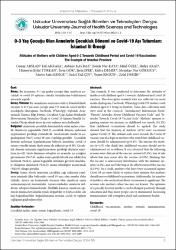0-3 yaş çocuğu olan annelerin çocukluk dönemi ve Covid-19 aşı tutumları: İstanbul ili örneği

View/
Date
2024Author
Arslan, GünayAkkaya, Elif
Kavraz, Aybüke
Kaya, Feride Nur
Özel, Hilal
Arat, Hülya
Türkan, Hümeyra Eylül
Gök, İrem
İpek, İrem
Demir, Kübra
Görmüş, Menekşe Nur
Mengü, Merve Safa
Yalçın, Sedef
Ergün, Yeşim
Demir, Zelal
Metadata
Show full item recordCitation
Arslan, G.; Akkaya, E.; Kavraz, A.; Kaya, F. N.; Özel, H.; Arat, H.; Türkan, H.E.; Gök, İ.; İpek, İ.; Demir, K.; Görmüş, M. N.; Mengü, M. S.; Yalçın, S.; Ergün, Y.; Zelal, D. 0-3 yaş çocuğu olan annelerin çocukluk dönemi ve Covid-19 aşı tutumları: İstanbul ili örneği (2024). Üsküdar Üniversitesi Sağlık Bilimleri ve Teknolojileri Dergisi, 1(1): 5-15.Abstract
Amaç: Bu araştırma; 0-3 yaş grubu çocuğu olan annelerin ço cukluk ve covid-19 aşılarına yönelik tutumlarının belirlenmesi
amacıyla yapıldı.
Gereç-Yöntem: Bu tanımlayıcı araştırma verileri, İstanbul ilinde
yaşayan ve 0-3 yaş arası çocuğu olan 533 anne ile sosyal medya
aracılığıyla (Instagram, Facebook, WhatsApp) toplandı. Araş tırmada Tanıtıcı Bilgi Formu, Çocukluk Çağı Aşıları Hakkında
Ebeveynlerin Tutumları Ölçeği ve Covid-19 Aşısına Yönelik Tu tumlar Ölçeği olmak üzere üç veri toplama aracı kullanıldı.
Bulgular: Annelerin çocukluk dönemindeki rutin aşılara yöne lik düşüncesi çoğunlukla (%81,2) çocukluk dönemi aşılarının
uygulanması gerektiği yönündeydi. Araştırmada annelerin ço ğunluğunun (%67) covid-19 aşısı yapıldığı görüldü. Çocukluk
dönemi aşılarının uygulanmasını belirten annelerin, covid-19
aşısına yönelik tutum ölçek puanı da yüksekti (p<0.05). Çocuk luk dönemi aşılarının uygulanmaması gerektiği düşünen anne lerin (n=42), böyle düşünme sebepleri ise sırasıyla; aşı içeriğine
güvenmeme (%47,6), aşıdan sonra görülebilecek yan etkilerden
korkmak (%14,2), aşının bağışıklık sistemine gereksiz müdaha le olduğunu düşünmek (%14,2), aşının etkinliğine inanmamak
(%11,9) olduğu görüldü.
Sonuç: Sonuç olarak annelerin çocukluk çağı aşılarının yapıl ması yönünde fikir belirtenler covid 19 aşısı olan anneler daha
fazladır. Ayrıca aşı konusunda kararsız olan annelerin sayısı
azımsanmayacak durumdadır. Aşıları reddeden annelerin red detme sebepleri bilinmektedir. Özellikle kararsız annelerin eği tim ile düşünceleri olumlu yönde değişebilir ve böylece daha çok
kişi bağışıklanabilir. Bağışıklamanın artması, çocuk ve toplum
sağlığının güçlendirecektir. This research; It was conducted to determine the attitudes of
mothers with children aged 0-3 towards childhood and Covid-19
vaccines. This descriptive research data was collected via social
media (Instagram, Facebook, WhatsApp) with 533 mothers with
children aged 0-3 living in Istanbul. Three data collection tools
were used in the research: “Introductory Information Form”,
“Parents’ Attitudes About Childhood Vaccines Scale” and “At titudes Towards Covid-19 Vaccine Scale”. Mothers’ opinion re garding routine vaccinations in childhood was mostly (81.2%)
that childhood vaccinations should be applied. The study
showed that the majority of mothers (67%) were vaccinated
against Covid-19. The attitude scale score towards the Covid-19
vaccine was also high in mothers who stated that childhood vac cines should be administered (p<0.05). The reasons for moth ers (n=433) who think that childhood vaccines should not be
administered are as follows; It was observed that the following
reasons were: distrust of the vaccine content (47.6%), fear of side
effects that may occur after the vaccine (14.2%), thinking that
the vaccine is unnecessary interference with the immune sys tem (14.2%), and not believing in the effectiveness of the vaccine
(11.9%). As a result, mothers who have been vaccinated against
Covid 19 are more likely to express their opinion that mothers
should receive childhood vaccinations. Additionally, the number
of mothers who are hesitant about vaccination is significant. The
reasons why mothers refuse vaccines are known. The opinions
of especially hesitant mothers can be changed positively through
education and thus more people can be immunized. Increasing
immunization will strengthen child and community health.
Source
Üsküdar Üniversitesi Sağlık Bilimleri ve Teknolojileri DergisiVolume
1Issue
1URI
https://hstjournal.com/makale/2https://doi.org/10.32739/hst.2024.1.1.2
https://hdl.handle.net/20.500.12780/878

















